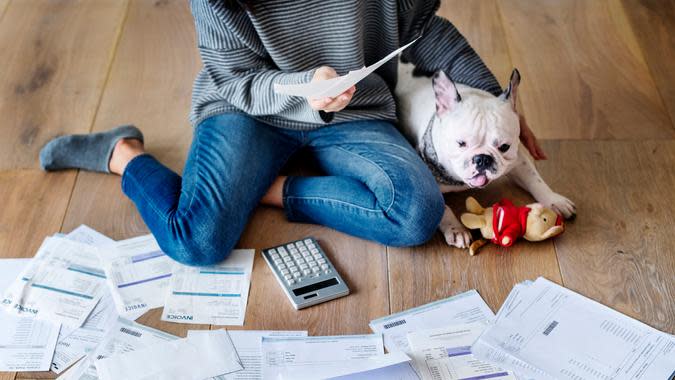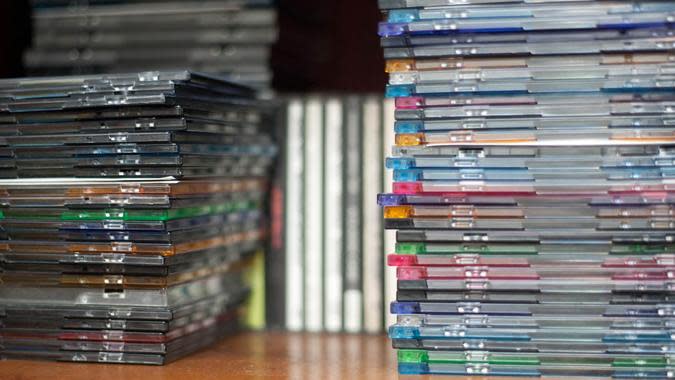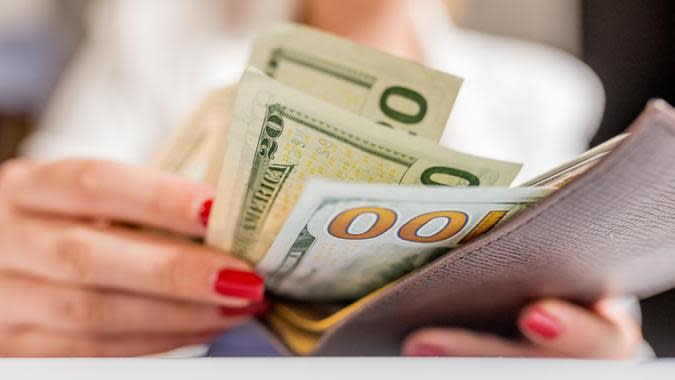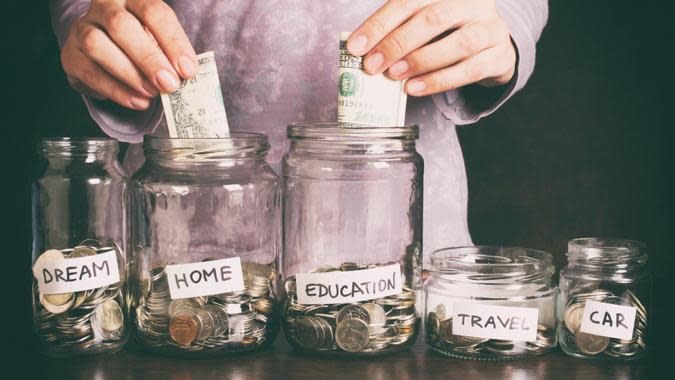How To Pay Off Your Holiday Credit Card Debt in 3 Months or Less

The holidays are a time for joy, family, giving ... and racking up debt.
Holiday Spending: Get Top Holiday Shopping and Savings Tips
Read: 3 Easy Tips To Turn Your Credit Woes Into Wows
It's easy to feel pressure to spend during the holidays, but you don't want to let overspending set you back financially in the new year. If you ended up charging a little too much in 2022, here's how to quickly pay off your holiday debt and start 2023 off on the right financial foot.

1. Figure Out How Much Debt You Have
To pay off your holiday debt quickly, you need to know what you're dealing with, said Steven Donovan, owner and money coach at EvenStevenMoney.com. That means opening your credit card bills or checking your statements online, then adding up all of your balances to get a clear picture of how much holiday debt you have.
"It doesn't help to stick your head in the sand -- the debt will still be there," Donovan said. "Remember, if you don't know where you are today, you won't know what direction to head."
Take Our Poll: How Long Do You Think It Will Take You To Pay Off Your Credit Card Debt?

2. Know Your Budget
In addition to having a clear idea of how much debt you have, it's also important to know how much money you have coming in and going out. Use budgeting software or an app like Mint to help determine what you need to set aside from each paycheck for essentials like rent, utilities and groceries. After that, figure out what's left to pay down debt.
"It is absolutely critical to have awareness of where your dollars are going before you can change where your dollars are going," said Addie McHale, a certified financial planner based in Denver. "Budgeting software will help you prioritize your dollars to live a more joyful life, help you use credit cards responsibly and help you save for your goals."

3. Dedicate a Portion of Every Paycheck Toward Debt Repayment
Once you've calculated exactly how much money from your paycheck is needed to cover essential costs, dedicate a set portion of whatever is left over to paying down your debt. Consider making this payment automatic.

4. Develop the Right Debt Payoff Mindset
You might feel overwhelmed by how much money you owe, but you can find the motivation to pay it off by focusing on the benefits of being debt-free. Melissa Thomas, founder of Melissa the Coach, a financial coaching website, recommends asking yourself why it's important to pay off your debt and what you'll do with the extra money once your debts are paid. Thomas paid off more than $40,000 in debt to free up more cash to go to Elton John concerts and possibly meet the rock legend in person someday.

5. Create a Debt Payoff Plan
Another way to avoid feeling overwhelmed by your debt is by breaking down the total you owe into manageable amounts, Thomas said. For example, if you have $1,000 of holiday debt and want to pay it off in three months, you'd need to make monthly payments of about $333. If you get paid twice a month, that's about $166 per paycheck, or roughly $11 a day.
You could also make a chart showing how much you need to pay each week or month to eliminate your debt and track your progress. Donovan said he did this as he paid off $300,000 in debt.

6. Start as Soon as Possible
You don't have to wait until you get your credit card bills to start making payments, said debt resolution attorney Leslie Tayne.
"In fact, the more frequently you make payments, the less interest you'll end up paying and the more quickly you'll be paid off," she said. "So you may want to consider making weekly or biweekly payments."

7. Try Paying Off High-Interest Debt First
"The credit cards with the highest interest rates are the ones that will end up costing you the most in the long run," Tayne said. "Consider focusing on those first to decrease how much you owe over time."

8. Or Pay Off the Smallest Balances First
Paying down credit cards with the lowest balances first is known as the "snowball method." Although you could pay off what you owe faster by prioritizing debt with the highest interest rate, focusing on credit cards with the smallest balances can give you a sense of accomplishment and build momentum to help you pay off bigger debts.
"For the snowball method, pay more than the minimum due towards the credit card with the lowest balance while paying the minimum payment on all other debt," said Brandon Neth, credit card and reward travel expert at FinanceBuzz.

9. Make More Than the Minimum Payment on at Least One Card at a Time
Whether you choose to pay off high-interest rate debt first or the smallest balance first, make sure you're paying more than the minimum payment on at least one of your cards. Ideally, you would pay more than the minimum on all of your cards, even if it's just an extra $10 or $20.

10. Always Pay Your Credit Card Bills on Time
"Make sure you always pay on time to avoid late fees," said Rod Ebrahimi, board member of Deck Flex. "Some credit card companies waive the fee for the first late payment but many charge up to $39 per late payment."
Unnecessary late fees will just pile onto the debt you already have.

11. Find Expenses You Can Temporarily Eliminate
To pay off your holiday debt quickly, Tayne recommends taking a look at what you might be able to live without for a few months. For example, you could cancel certain subscription services, eliminate lunches out and make coffee at home to free up extra cash for debt repayment. "And you may find that even after your debts are paid off, you may not miss what you cut back on," Tayne said.

12. Minimize Costs You Can't Eliminate
You can't eliminate all of your monthly expenses, but there are plenty you can reduce. For example, you can cut your phone and cable bills by contacting your providers and convincing them to lower your rate.
"Once you are chatting with a customer rep, tell them that you want to cancel your service because the monthly payment is too high and mention how much cheaper the service is over at the competition," Donovan said. He helped a client save $50 a month by doing this, which adds up to $600 in savings over the course of a year.

13. Put a Temporary Pause on Nonessential Savings Contributions
If you're saving for an emergency fund, keep those contributions going. Not having an emergency fund in place will make you turn to credit cards or loans if a financial emergency hits, which will only add to your debt. However, if you're saving toward a vacation or have a portion of 401(k) contributions that are not being matched, consider pausing your contributions until after your debt is paid off.

14. Make Extra Money for Debt Payments
After the hustle and bustle of the holidays, take time to go through your stuff to find things you no longer need that you can sell for cash. "When I first started paying off debt, I sold my camping backpack from college on eBay," Donovan said. "I took the $88 and applied it directly to my debt."
You can sell DVDs, books and electronics through websites such as Decluttr, or sell unwanted gift cards online at sites like CardCash. You also can pick up a side hustle in your free time to bring in extra money for debt repayment.

15. Use Your Holiday Gifts To Pay Off Your Debt
If you received cash gifts for the holidays, put that money toward paying off your debt right away. It might not be as fun as treating yourself to a new pair of shoes or headphones, but it's a much better use of your funds.
Even if you didn't get cash, you can still turn your gifts into a debt repayment tool. Return or resell any gifts you know you won't really get much use out of and give that cash to your credit card company.

16. Put Your Holiday Bonus Toward Paying Down Credit Card Debt
If you're lucky enough to get a holiday bonus, chances are you've already spent it on gifts (for others or yourself). But if you held onto it, consider putting that holiday or year-end bonus toward your credit card balance.

17. Make Use of Credit Card Rewards
If you have cash-back or rewards credit cards, consider putting them to use to help pay off your holiday debt. Some companies let you redeem credit card rewards for a statement credit to reduce the amount you owe.

18. Negotiate a Lower Interest Rate
The lower your interest rate on your credit cards, the less you'll have to pay on top of your balances. That's why Tayne recommends negotiating with your credit card company for a lower rate.
"Call the company and let them know that you've been shopping around for a better rate," she said. "Emphasize that you've been a good customer, always making payments on time and making more than minimum payments. The company may be willing to work with you for a lower rate, which will allow you to pay off more quickly."

19. Transfer Debt to a 0% APR Credit Card
You might be able to eliminate interest on your credit card debt altogether if you take advantage of a 0% balance-transfer offer and pay off what you owe during the period when the zero interest rate applies. Watch out for balance transfer fees, though.

20. Consider Taking Out a Personal Loan
If you don't want to open another credit card, taking out a personal loan is another option for consolidating credit card debt.
"Personal loans used to pay off a credit card will come with interest, but they also come with a fixed payoff date," Ebrahimi. "This can be an attractive option if you want to know exactly when you'll be out of debt and avoid the risk of falling into new credit card debt."

21. Stick To Cash
If you want to pay off holiday debt quickly, you have to avoid racking up more debt. "If you are struggling with spending, I recommend switching to cash to become more disciplined," Donovan said. Allot yourself a certain amount of cash each week. Once it's gone, that's all you're allowed to spend.
Not only can using cash help reduce your reliance on credit, but it also might help reduce your overall spending. It's easier to feel the pain of parting with cash more when it leaves your wallet, Donovan said.

22. Stop Using All Credit Cards That Have Balances
If you absolutely must use a credit card, opt for one that doesn't already carry a high balance. Don't make any new charges on your card with the highest balance, said Wilson Muscadin, financial coach and founder of The Money Speakeasy.
"Do everything in your power not to use the card at all while paying it off," he said. "Take it out of your wallet, remove it from the saved payment option in online sites or, in the extreme, you can cut it in half. Using a credit card while paying it off is like scooping water out of a boat with a leak in it. Plug the leak first and then scoop the water out."

23. Create an After-Action Plan
After paying off your holiday debt, you need to take steps to avoid racking up debt again next holiday season. "The best way to get out of debt is to not accrue it in the first place," Thomas said. She recommends creating a savings plan to have enough cash for the holidays in 2023.
Just as you created a plan to pay off debt by breaking down what you owed into smaller payments, you can figure out what you need to save based on your holiday spending. Once you've determined that amount, divide it by the number of months left in the year until the holidays to know how much you need to set aside each month to cover future costs.
More From GOBankingRates
Gabrielle Olya contributed to the reporting for this article.
This article originally appeared on GOBankingRates.com: How To Pay Off Your Holiday Credit Card Debt in 3 Months or Less

